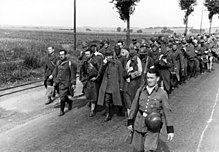French prisoners of war in World War II

After the French armies surrendered during and after the Battle of France in the summer of 1940, Germany seized two million prisoners of war from France and its colonies and sent them to camps in Germany.[note 1] About one third were released on various terms. Of the remainder, the officers and noncommissioned officers were kept in separate camps and did not work. The privates were sent out to work. About half of them worked in German agriculture, where food supplies were adequate and controls were lenient. The others work in factories or mines, where conditions were much harsher.[1][2]
Work camps

About one third were released on various terms. Of the remainder, the officers and noncommissioned officers were kept in 'Offizierslager' (officers' camps or "Oflags") and did not work. The privates were sent out to work. About half of them worked in German agriculture, where food supplies were adequate and controls were lenient. The others worked in factories or mines, where conditions were much harsher. [3] Jewish POWs were not singled out by the Nazis.
The Germans held 120,000 non-white soldiers from the French colonies. These men were not sent to Germany; instead they were put to work on German Army projects inside France's Occupied Zone. Conditions were somewhat better for them than for the Frenchman held in Germany. However, they became very hostile to the Vichy regime, and on their return to the colonies rejected the idea of a close relationship with France.[4] In the last days of combat in June 1940, German units killed several thousand black soldiers and POWs in French colonial regiments. About 60,000 black soldiers survived, and were treated like the other colonial POWs.[5]
Repatriation
Between 1940 and 1941, 330,000 were eventually returned to France or repatriated for medical reasons, while 16,000 managed to escape.[6]
The prisoners were repatriated to France in the summer of 1945. The reunion was not a happy one. Many returned to an atmosphere of indifference or scorn that they had allowed themselves to be captured rather than to have died for their country.[7]
Meanwhile, while the men were gone, their wives became more independent. The Vichy government provided a small stipend; about 10% took to prostitution to provide essentials for their children. The government promoted a "cult of the return," with the theme that women earning wages or raising children on their own did so only temporarily until their husbands returned. After the war, there was a restoration of traditional patriarchal authority in the family.[8]
See also
- Belgian prisoners of war in World War II
- Military history of France during World War II
- Prisoner of war
Citations
- ^ There never was an official French count, and estimates range from 1.5 million to two million men.
References
- ^ Richard Vinen, The Unfree French: Life under the Occupation (2006) pp 183-214
- ^ Christopher Lloyd, "Enduring Captivity: French POW Narratives of World War II 1." Journal of War & Culture Studies (2013) 6#1 pp: 24-39.
- ^ Richard Vinen, The Unfree French: Life under the Occupation (2006) pp 183–214
- ^ Raffael Scheck, "French Colonial Soldiers in German Prisoner-of-War Camps (1940–1945)," French History (2010) 24#3 pp 420–446.
- ^ Raffael Scheck, Hitler's African Victims: The German Army Massacres of Black French Soldiers in 1940 (2008) pp. 2–4
- ^ Éric Conan; Henry Rousso (1998). Vichy: An Ever-Present Past. UPNE. p. 129.
- ^ Sarah Fishman, "Grand delusions: The unintended consequences of Vichy France's prisoner of war propaganda," Journal of Contemporary History (1991) 26#2 pp 229–54
- ^ Sarah Fishman, and Patricia J. Hilden, "The Cult of the Return: Prisoner of War Wives in France during the Second World War," Proceedings of the Western Society for French History (1990) Vol. 17, pp 438–446
Further reading
- Diamond, Hanna (2008). Fleeing Hitler : France 1940. Oxford: Oxford University Press. ISBN 9780199532599.
- Fishman, Sarah. We Will Wait: Wives of French Prisoners of War, 1940–1945 (1991)
- Gildea, Robert. Marianne in Chains: Everyday Life in the French Heartland Under the German Occupation (2002) pp 70–89
- Lloyd, Christopher. "Enduring Captivity: French POW Narratives of World War II 1." Journal of War & Culture Studies (2013) 6#1 pp: 24-39.
- Vinen, Richard. The Unfree French: Life under the Occupation (2006) pp 183–214
